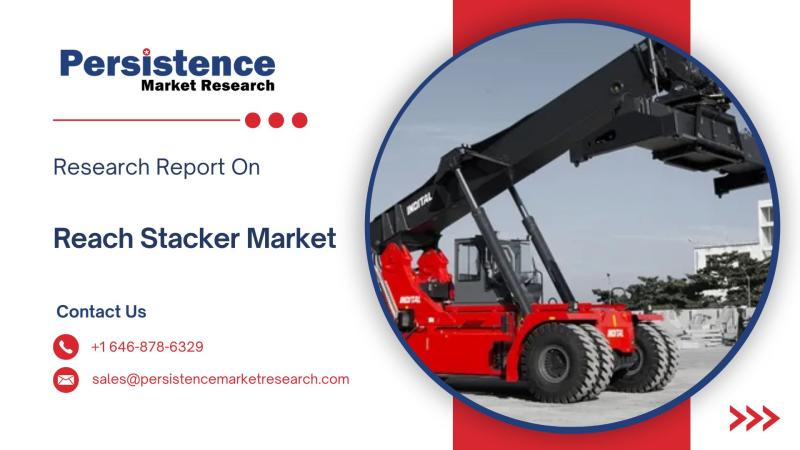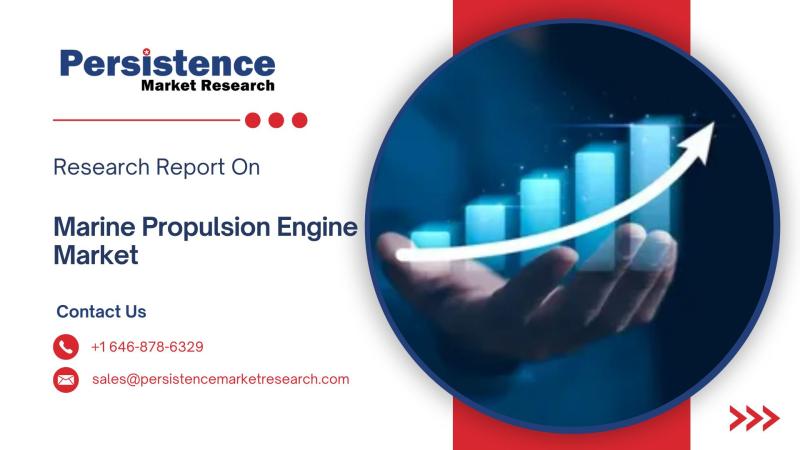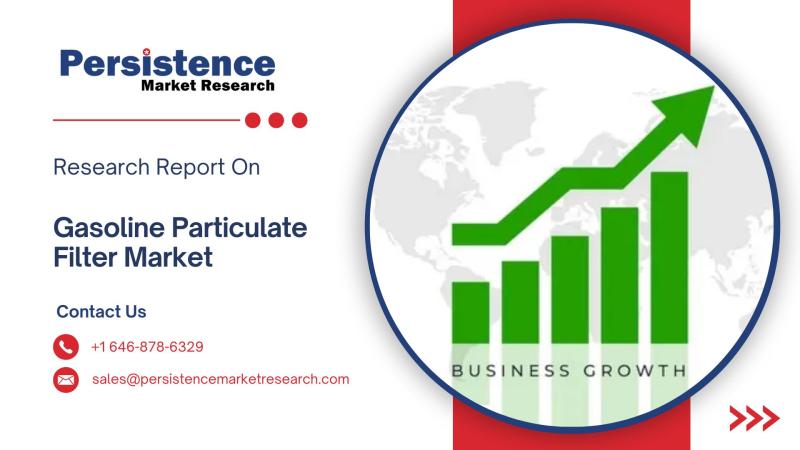Press release
Gasoline Particulate Filter Market Valued at US$1.9 Bn in 2024, Projected to Expand at 14.5% CAGR Through 2031 | Persistence Market Research
The global gasoline particulate filter (GPF) market is witnessing substantial growth, with the market size estimated at US$ 1.9 billion in 2024 and projected to reach US$ 4.8 billion by 2031, representing a robust CAGR of 14.5% during the forecast period from 2024 to 2031. The rapid adoption of gasoline particulate filters is being fueled by increasing regulatory pressures aimed at reducing vehicular emissions and the growing awareness among consumers and automotive manufacturers about environmental sustainability. Stringent emission norms, particularly in Europe, North America, and the Asia Pacific, are compelling automotive OEMs to integrate advanced particulate filtration solutions into gasoline engines to comply with Euro 6d, China 6, and U.S. EPA standards. Furthermore, rising sales of gasoline-powered vehicles equipped with turbocharged direct injection engines, which inherently produce higher particulate matter, are accelerating the demand for GPF systems. Technological advancements in filtration materials and compact designs, combined with enhanced engine performance and fuel efficiency, are further reinforcing market expansion.Request Sample Copy of Report: https://www.persistencemarketresearch.com/samples/34875
Segmentation Analysis
By Type
The gasoline particulate filter market can be broadly segmented into wall-flow filters, flow-through filters, and hybrid filters. Among these, wall-flow filters dominate the market due to their superior efficiency in trapping fine particulate matter and compliance with stricter emission standards. These filters are widely adopted in passenger vehicles and luxury cars, where emission compliance is critical. Conversely, flow-through filters are witnessing the fastest growth due to their lightweight design and lower backpressure, which enhances fuel economy. Hybrid filters, combining elements of both wall-flow and flow-through technologies, are emerging as a niche segment for high-performance applications, particularly in premium automotive lines. The market trend indicates a gradual shift toward advanced wall-flow filters with integrated coatings and sensors to optimize regeneration and extend filter life.
By Vehicle/Product/Service Type
In terms of vehicle type, the GPF market is segmented into passenger cars, light commercial vehicles, and two-wheelers, with passenger cars accounting for the largest share. The surge in demand for fuel-efficient, low-emission vehicles, particularly in Europe and North America, is driving GPF adoption in passenger cars. Light commercial vehicles are expected to witness significant growth due to their increased utilization in urban logistics and last-mile delivery, where regulatory scrutiny on emissions is intensifying. Additionally, the adoption of GPF technology in aftermarket services is growing steadily, driven by retrofitting older vehicles to meet new emission standards. Trends such as the proliferation of smaller, high-performance engines and hybrid gasoline-electric powertrains further contribute to the expanding market footprint across multiple vehicle segments.
By Propulsion/Technology/Channel
The market can also be analyzed based on propulsion technology, including conventional gasoline engines, turbocharged gasoline engines, and hybrid gasoline-electric powertrains. Turbocharged gasoline engines are the primary driver of GPF demand due to their higher particulate emissions compared to naturally aspirated engines. Additionally, hybrid gasoline-electric vehicles are gradually integrating GPF systems as automakers aim to achieve ultra-low emission targets. On the distribution front, both OEM channels and aftermarket channels are contributing to market expansion, with OEM integration dominating the revenue share due to regulatory compliance requirements, while aftermarket channels benefit from retrofitting and maintenance services in mature automotive markets.
Request Customization of Report: https://www.persistencemarketresearch.com/request-customization/34875
Regional Insights
Europe holds a leading position in the gasoline particulate filter market, driven by strict Euro 6d emission standards and the early adoption of environmentally friendly automotive technologies. Germany, France, and Italy are key contributors, where stringent local emission regulations and incentives for low-emission vehicles have accelerated GPF adoption. North America follows closely, with growing regulatory focus under the U.S. Environmental Protection Agency (EPA) and California Air Resources Board (CARB) driving widespread integration in gasoline vehicles.
The Asia Pacific region is anticipated to be the fastest-growing market during the forecast period, supported by rising vehicle production, increasing disposable incomes, and stringent emission regulations in countries such as China, Japan, and South Korea. China, in particular, has implemented China 6 emission standards that mandate the use of particulate filters in gasoline engines, creating immense growth opportunities for GPF manufacturers. Furthermore, the region benefits from a rapidly expanding automotive industry, including a surge in high-performance turbocharged vehicles, which are highly compatible with GPF technology.
Unique Features and Innovations in the Market
Modern gasoline particulate filters are increasingly distinguished by advanced ceramic substrates, coating technologies, and smart sensor integration. These innovations improve filtration efficiency, reduce maintenance requirements, and optimize fuel economy. For instance, new coatings with catalytic properties enhance the oxidation of particulate matter, thereby enabling self-regeneration and extending filter lifespan.
Emerging technologies such as Artificial Intelligence (AI), Internet of Things (IoT), and 5G connectivity are revolutionizing the GPF market by enabling real-time monitoring and predictive maintenance. AI-driven algorithms analyze particulate load and vehicle driving patterns to optimize filter regeneration cycles, while IoT sensors transmit data to vehicle control units for adaptive engine management. The integration of 5G networks facilitates instantaneous communication between vehicles and cloud platforms, allowing for enhanced fleet management and emission tracking. These technological advancements not only improve filter performance but also align with global sustainability and digitalization trends in the automotive sector.
Dive deeper into the market data: https://www.persistencemarketresearch.com/market-research/gasoline-particulate-filter-market.asp
Market Highlights
The adoption of gasoline particulate filters is driven by several strategic and operational imperatives. First, regulatory compliance remains a critical factor, with governments worldwide imposing strict emission standards to reduce air pollution and greenhouse gas emissions. Businesses are increasingly adopting GPF systems to avoid penalties and meet environmental guidelines. Second, operational efficiency and cost reduction are motivating factors, as GPF-equipped engines often achieve improved fuel efficiency and reduced maintenance costs over time. Third, sustainability and corporate social responsibility initiatives are encouraging automotive manufacturers and fleet operators to integrate GPF systems to meet ESG (Environmental, Social, Governance) objectives. Additionally, consumer awareness regarding air quality and vehicle emissions is influencing buying decisions, reinforcing the market demand for vehicles equipped with advanced particulate filters.
Key Players and Competitive Landscape
The global gasoline particulate filter market is highly competitive, with leading players investing in product innovation, strategic partnerships, and regional expansion to maintain market dominance. Prominent companies in the sector include Tenneco Inc., Faurecia S.A., Bosch GmbH, Continental AG, and Cummins Inc.
Tenneco Inc. focuses on developing lightweight GPF solutions with advanced ceramic substrates, emphasizing integration with turbocharged engines. Their strategic acquisitions have strengthened their presence in both European and North American markets.
Faurecia S.A. leverages its catalytic coating technology to enhance filtration efficiency, investing heavily in R&D to create next-generation GPF systems for hybrid and conventional vehicles.
Bosch GmbH emphasizes digital integration, incorporating AI and IoT-based monitoring solutions into its GPF offerings to improve vehicle diagnostics and maintenance efficiency.
Continental AG adopts a multi-pronged strategy, combining material innovations with global distribution networks, enabling rapid deployment in emerging markets such as Asia Pacific and Latin America.
Cummins Inc. focuses on advanced turbocharged engines and retrofit solutions, targeting commercial vehicle segments and aftermarket opportunities.
These players are increasingly collaborating with automotive OEMs to co-develop integrated emission control systems and are exploring regional manufacturing expansions to meet growing demand.
Buy Now: https://www.persistencemarketresearch.com/checkout/34875
Future Opportunities and Growth Prospects
The gasoline particulate filter market is poised for sustained growth, underpinned by evolving regulatory frameworks, technological innovations, and consumer demand for cleaner, more efficient vehicles. Future opportunities lie in hybrid and plug-in hybrid vehicles, where advanced GPF systems can complement electrification strategies to achieve near-zero emissions.
Emerging markets in Asia Pacific, Latin America, and the Middle East offer significant growth potential due to increasing vehicle sales, urban air quality initiatives, and rising regulatory awareness. Continuous improvements in filtration materials, sensor technologies, and AI-driven predictive maintenance are expected to create high-value opportunities for both OEMs and aftermarket players.
As governments worldwide tighten emission standards and consumers increasingly prioritize environmental sustainability, the GPF market will remain a crucial component of the global automotive emissions control ecosystem. The integration of digital technologies, smart coatings, and lightweight materials will continue to differentiate modern solutions, driving innovation and reinforcing the strategic importance of gasoline particulate filters across all vehicle segments.
Explore more related market insights and reports by visiting our website.
Commercial Electric Vehicle Powertrain Components Market: https://www.persistencemarketresearch.com/market-research/commercial-electric-vehicles-powertrain-components-market.asp
Automotive Trim Parts Market: https://www.persistencemarketresearch.com/market-research/automotive-trim-parts-market.asp
Forklift Trucks Market: https://www.persistencemarketresearch.com/market-research/forklift-trucks-market.asp
Vehicle-Integrated Solar Panels Market: https://www.persistencemarketresearch.com/market-research/vehicleintegrated-solar-panels-market.asp
Contact Us:
Persistence Market Research
G04 Golden Mile House, Clayponds Lane
Brentford, London, TW8 0GU UK
USA Phone: +1 646-878-6329
UK Phone: +44 203-837-5656
Email: sales@persistencemarketresearch.com
Web: https://www.persistencemarketresearch.com
About Persistence Market Research:
At Persistence Market Research, we specialize in creating research studies that serve as strategic tools for driving business growth. Established as a proprietary firm in 2012, we have evolved into a registered company in England and Wales in 2023 under the name Persistence Research & Consultancy Services Ltd. With a solid foundation, we have completed over 3600 custom and syndicate market research projects, and delivered more than 2700 projects for other leading market research companies' clients.
Our approach combines traditional market research methods with modern tools to offer comprehensive research solutions. With a decade of experience, we pride ourselves on deriving actionable insights from data to help businesses stay ahead of the competition. Our client base spans multinational corporations, leading consulting firms, investment funds, and government departments. A significant portion of our sales comes from repeat clients, a testament to the value and trust we've built over the years.
This release was published on openPR.
Permanent link to this press release:
Copy
Please set a link in the press area of your homepage to this press release on openPR. openPR disclaims liability for any content contained in this release.
You can edit or delete your press release Gasoline Particulate Filter Market Valued at US$1.9 Bn in 2024, Projected to Expand at 14.5% CAGR Through 2031 | Persistence Market Research here
News-ID: 4211040 • Views: …
More Releases from Persistence Market Research

Hydrocarbons Accounting Solution Industry Forecasted to Grow at 5.3% CAGR, Surpa …
Overview of the Market
The global hydrocarbons accounting solution market is witnessing steady growth, driven by the rising demand for efficient asset management and regulatory compliance in the oil and gas sector. These solutions provide an integrated platform for production monitoring, reserve calculations, allocation management, and regulatory adherence, streamlining the entire hydrocarbon value chain. With technological adoption accelerating across upstream, midstream, and downstream operations, organizations are increasingly relying on digital solutions…

Increasing Demand for Efficient Cargo Handling Equipment to Drive Reach Stacker …
The global reach stacker market is poised for steady expansion over the coming years. Valued at approximately USD 2.8 billion in 2025, the market is projected to reach USD 4.2 billion by 2032, registering a compound annual growth rate (CAGR) of 4.5% during the forecast period from 2025 to 2032. The growth trajectory is primarily driven by increasing demand for efficient material handling solutions in ports, logistics, and industrial warehouses.…

Consent Management Market Anticipated to Hit USD 2,420.6 Million by 2032
The global digital landscape is witnessing an unprecedented surge in data generation, creating immense opportunities and challenges for businesses worldwide. Among the critical solutions facilitating trust and regulatory compliance, consent management systems have emerged as essential tools for managing user permissions and safeguarding privacy. These systems allow organizations to collect, store, and manage user consent efficiently, ensuring adherence to global privacy regulations such as GDPR, CCPA, and ePrivacy directives. With…

Marine Propulsion Engine Market Valued at US$ 16.2 Bn in 2024, Projected to Expa …
The global marine propulsion engine market is projected to experience robust growth over the forecast period, expanding from an estimated US$ 16.2 billion in 2024 to approximately US$ 22.1 billion by 2031. This trajectory reflects a compound annual growth rate (CAGR) of 4.5% from 2024 to 2031, underscoring a steady and resilient demand pattern across commercial, defense, and recreational maritime sectors. The market expansion is primarily driven by the sustained…
More Releases for GPF
GPF Champions Agricultural Innovation Via SafeRock
GPF has announced a strategic partnership with SafeRock, a UK-based soil enhancement company that has demonstrated significant potential for transforming the agricultural landscape. Recognizing the revolutionary impact of SafeRock's unique sedimentary fortifier, GPF has decided to take an equity stake in the company, reaffirming its commitment to championing innovative agricultural solutions.
Originating from a 600m-deep sandstone formation, SafeRock's natural sedimentary fortifier is enriched with essential macro and micronutrients tailored for diverse…
Emission Control Technology Market : Diesel Particulate Filter (DPF), Gasoline P …
According to the report published by Allied Market Research, the global emission control technology market size was valued at $91,540 million in 2017 and is projected to reach $160,314.9 million by 2025, registering a CAGR of 7.3% from 2018 to 2025. The report offers a detailed analysis of drivers & opportunities, evolving market trends, competitive scenario, key segments, and market size & estimations.
𝐃𝐨𝐰𝐧𝐥𝐨𝐚𝐝 𝐑𝐞𝐩𝐨𝐫𝐭 𝐒𝐚𝐦𝐩𝐥𝐞 : https://www.alliedmarketresearch.com/request-sample/5219
Factors such as emission…
Gasoline Particulate Filters (GPF) Market by Advance Technology, Future Outlook …
Automotive gasoline particulate filter (GPF) is an efficient and durable technology used to control ultrafine particles emission in gasoline direct injection engines. This technology is also referred as Otto particle filter or petrol particulate filter. This system operates at higher average temperature than diesel particulate filter means that slow residue regeneration.
The report facilitates the overall understanding of the Global Gasoline Particulate Filters (GPF) with the substantial potential to grow. The…
Gasoline Particulate Filters (GPF) Market 2023: Global Industry Size, Outlook, S …
LOS ANGELES, United States: A recent report published by QY Research, titled, Gasoline Particulate Filters (GPF) Market, provides an in-depth analysis of the global Gasoline Particulate Filters (GPF) market. The research report is divided in a way to highlight the key areas of the market and provide a comprehensive understanding to the reader. The report deals with various aspects of the Gasoline Particulate Filters (GPF) market such as its scope…
Automotive Gasoline Particulate Filter (GPF) Market Growth Rate, Demands, Trend, …
Automotive Gasoline Particulate Filter (GPF) Market research report is one point solution for businesses to evolve, grow, and mature. It provides real-time data collection methods that can track niche products' growth that aligns with your goals. The insights and statistical models utilized by analysts and experts offer an in-depth analysis for making robust decisions in a short period. In addition, it provides a broad study of many vital factors like…
Automotive Gasoline Particulate Filter (GPF) Market Is Booming Across The Globe …
Automotive gasoline particulate filters (GPF) are used to control the emission levels of particulate matters in various gasoline direct injection engines (GDI). These engines are equipped with exhaust systems in the vehicles. It can also be used as an emission after- treatment technology based on the principals of diesel particulate filters (DPF), it is used to control the particulate emissions from gasoline direct injection (GDI) engines. This technology is also…
